It was the best of times, it was the worst of times
For Director of Drama Dr. Sarah Fanning — as for many — the pandemic brought about great change for her field. Drama classes and productions had to be moved online — something she says only strengthened her and her colleagues’ belief in the power of hands-on learning and of being in the same space with each other.
“Technology cannot replace that spontaneity, social bonding, team building, and leadership of being together for drama,” she says. “We now all have a greater appreciation for what we do and for each other. Theatre is meant for a 3D space, not the screen, and that was really underscored during the pandemic.”
But she also realized a much better use of screen time.
Fanning saw an academic area of opportunity at Mount Allison that she felt would be beneficial and interesting for students — screen studies. An area of interest and expertise for Fanning, she spearheaded the addition of an interdisciplinary screen studies and popular culture minor.
Now a full-time professor in drama and screen studies, Fanning’s goal is to grow and develop this interdisciplinary area of study into its own program or a collaborative department.
She says screen studies has helped not only expand the education of students, but also her ability to collaborate across disciplines on campus.
“I now collaborate more with the sciences and social sciences to create a more inclusive teaching environment,” she says. “It’s really rewarding to be able to satisfy that call to innovate our programs, but also to engage and excite the students.”
In one of her new courses, Adaptation: Page to Screen, which looks at film and television adaptations of narratives, including fiction, history, and true crime, she collaborated with Dr. Matt Betti, assistant professor in the Department of Mathematics and Computer Science, as part of a true crime module that looked at the film Zodiac about the Zodiac Killer.
The film plays up the dramatic aspect of code-breaking and viewers believe he was never caught because he was smart. Betti helped demythologize that idea by giving the students some of the Zodiac ciphers to decode and teaching them how to fill in some of the letters based on statistical probabilities.

“These students are traditionally much more abstract thinkers, so it was cool to have them follow this sort of logic to solve a problem,” says Fanning.
Fanning earned her PhD in English film and visual culture from the University of Exeter. Along with her main area of research on the Brontë sisters, she is interested in the criminal mind, investigative techniques used to catch killers, criminal profiling, how killers are represented in the media and on-screen, and how the public engages with such narratives through dramatic forms like documentaries.
Her favourite true crime is Mindhunter, both the book and the Netflix series. She is currently working on an edited collection called Serial Killing on Screen: Adaptation, True Crime, and Popular Culture in an upcoming book project.
Next year, two new courses will be introduced in screen studies at Mount Allison — Crime on Screen and Mental Health on Screen.
Read more about the Screen Studies and Popular Culture program.


